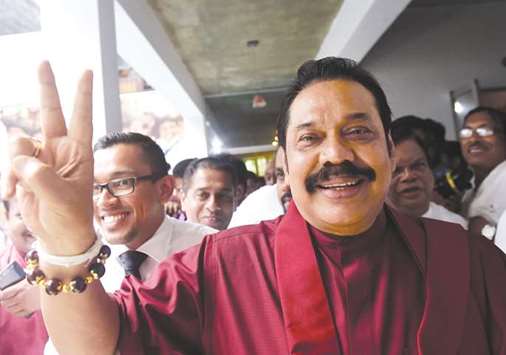Sri Lanka’s former leader Mahinda Rajapakse yesterday demanded a snap general election and challenged his successor’s right to govern after drubbing the ruling coalition in crucial mid-term polls.
Rajapakse’s new party secured two-thirds of Sri Lanka’s councils in a surprise blitz of local elections, humiliating the governing alliance as it reels from internal crises and
divisions over leadership.
“The government no longer has a mandate,” said Rajapakse, who lost presidential and parliamentary polls in 2015 after ruling the island with an iron fist for a decade.
“I ask the president to call a general election.”
Rajapakse, whose family wields enormous influence in Sri Lanka, staged a dramatic comeback at the weekend as his Sri Lanka Podujana Peramuna – SLPP or People’s Front – pulled off the landslide victory.
SLPP won control of 231 local councils out of a total 340 while United National Party (UNP) of Prime Minister Ranil Wickremesinghe took 34 councils and the rest were split among other parties.
Rajapakse’s party comfortably won in all regions bar the battle-scarred north and east where, as president, he brutally crushed a separatist Tamil movement to end the island’s ethnic war in 2009.
The vote affects only the lowest rung of politics but the result is being seen as a stinging rebuke to the ruling coalition, which has struggled to pass promised post-war reforms.
President Maithripala Sirisena was elected in part on a promise to reform the constitution, grant greater autonomy to minority Tamils and reconcile for a decades-long ethnic war that claimed more than 100,000 lives.
Parliament has been debating the proposed arrangements to share political power with Tamils but has made little ground.
Rajapakse – a member of the majority Sinhalese community – said the election result at the weekend was a referendum on these reforms.
“People voted against the division of the country,” he said.
The president has no power to sack the legislature but parliament – whose term ends in 2020 – can vote to dissolve and call early elections with the support of two-thirds of its members.
There has been no reaction from Sirisena or his coalition ally Prime Minister Ranil Wickremesinghe since their thumping defeat.

Mahinda Rajapakse waves to supporters at the party office following a press conference in Colombo yesterday.
